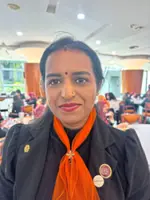Women bear the brunt of digital abuse - threatened with rape and exploited for porn - as the coronavirus pandemic drives ever more people online, media experts said on Wednesday.
Through salacious claims and viral memes, Brazilian journalist Patricia Campos Mello said she has repeatedly faced attack online for reporting on the Brazil government's handling of the Covid-19 crisis.





